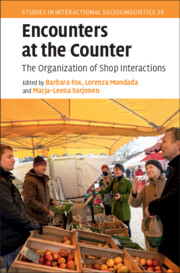Book contents
- Encounters at the Counter
- Studies in Interactional Sociolinguistics
- Encounters at the Counter
- Copyright page
- Contents
- Contributors
- 1 Encounters at the Counter
- 2 Approaching the Counter at the Supermarket
- 3 Customers’ Inquiries about Products
- 4 Offering a Taste in Gourmet Food Shops
- 5 Embodied Trajectories of Actions in Shop Encounters
- 6 Unpacking Packing
- 7 The Request-Return Sequence
- 8 Moving Money
- Appendix Transcription Conventions
- Index
- References
6 - Unpacking Packing
Published online by Cambridge University Press: 19 January 2023
- Encounters at the Counter
- Studies in Interactional Sociolinguistics
- Encounters at the Counter
- Copyright page
- Contents
- Contributors
- 1 Encounters at the Counter
- 2 Approaching the Counter at the Supermarket
- 3 Customers’ Inquiries about Products
- 4 Offering a Taste in Gourmet Food Shops
- 5 Embodied Trajectories of Actions in Shop Encounters
- 6 Unpacking Packing
- 7 The Request-Return Sequence
- 8 Moving Money
- Appendix Transcription Conventions
- Index
- References
Summary
The chapter examine a normative orientations of packing items at a farmer’s market in Sweden. It shows that the orientations to who should pack and under what circumstances reveal the deeply moral and interactional character of packing. While customers are expected to pack most items on their own, bulk items – such as potatoes – are normatively packed by the seller. When these norms are violated, such as when customers ask to pack their own potatoes, moral indignation may result. The study further examines instances in which the seller displays difficulty in packing; customers’ careful offers of assistance in these cases display an orientation to the autonomy of the seller and call into question the universal desirability of offers of assistance.
Keywords
- Type
- Chapter
- Information
- Encounters at the CounterThe Organization of Shop Interactions, pp. 184 - 213Publisher: Cambridge University PressPrint publication year: 2023



